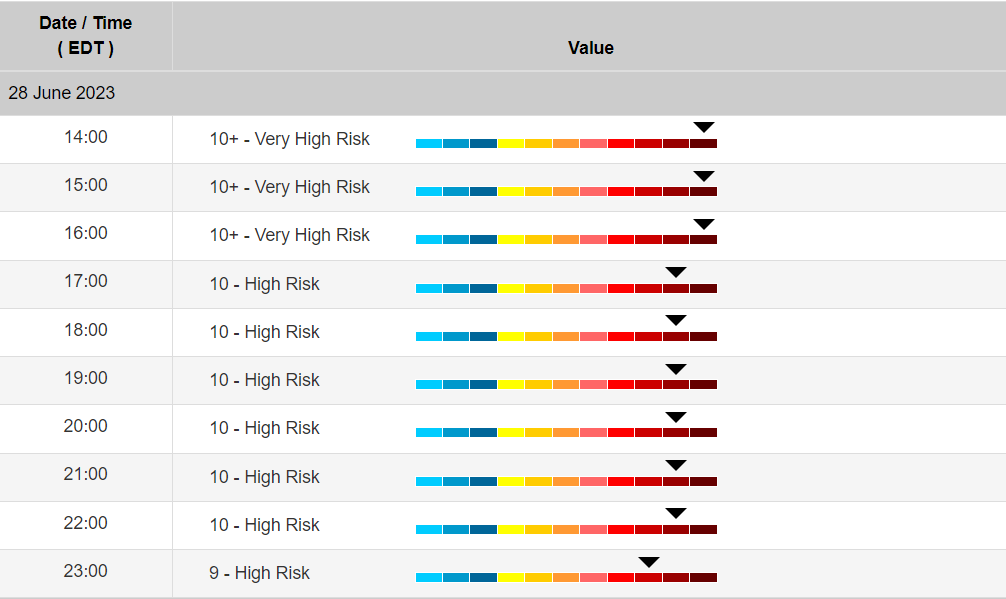Smoke from wildfires causing air quality warning in southern Ontario
Environment Canada is warning “high levels of air pollution” are developing across a large swath of southern Ontario due to smoke from forest fires.
The national weather agency issued a special air quality statement for Waterloo region just before 2:30 p.m. on Tuesday.
"Today is the first day I smelt the air," one Waterloo region resident said. "And it smelled like someone was having a BBQ."
At the time of the statement, the Air Quality Health Index (AQHI) for Kitchener was level 2, which is low risk.
Level 10 is the highest level in the AQHI before it becomes very high risk.
On Wednesday morning, the index sat at level 8, and was predicted to get to level 10+ by 2 p.m.
 On Wednesday, the Air Quality Health Index showed the air quality could reach the very high risk category on Wednesday. (Environment Canada)
On Wednesday, the Air Quality Health Index showed the air quality could reach the very high risk category on Wednesday. (Environment Canada)
"I've never experienced so much smog, so much darkness, so much bad air quality," said another resident. "Just going outside, looking around, not being able to see a few blocks, it scares you."
Early Wednesday, the agency updated its statement saying air quality and visibility can fluctuate over short distances and vary from hour to hour.
"I am definitely concerned," another resident said. "Not just about the air quality for the fires, but about all the issues coming from the climate crisis as it gets worse year after year."
UW PROF SPEAKS ABOUT AIR QUALITY
Experts say Kitchener’s air quality should be concerning for everyone in the area, especially for pregnant women, children, elderly residents and anyone with a heart or lung condition.
University of Waterloo professor Rebecca Saari said as wildfire smoke continues to linger week by week, it starts to become much more of an issue compared to a single-day event.
She said prolonged air quality deterioration could impact rates of asthma attacks, hospitalizations, maternal complications and more.
Saari said if you absolutely need to go outside, you should wear a certified N-95 mask to protect yourself.
“That can help reduce your exposure to some of that wildfire smoke,” Saari said. “Not any associated gasses that can also be harmful, but it can provide protection to the smoke and those are the levels that are the most elevated that we’re seeing now.”
Wildfire smoke can be harmful to everyone’s health even at low concentrations. Everyone can take action to reduce their exposure to wildfire smoke, Environment Canada said in the alert.
"Anytime you see the air quality health index getting to the 4-6 range, that's when you should start to feel a bit concerned, especially if you are one of those at risk groups," said Steven Flisfeder, a warning preparedness meteorologist. "In particular, people with pre-existing health conditions, they're particularly at risk. It could aggravate their chronic illness even more. In addition, young children, pregnant women, and the elderly are all at risk."
Earlier this month, large parts of Ontario, including Waterloo region, were included in a multi-day air quality statement as smoke from wildfires in northern Ontario and Quebec lingered over the province.
The air quality statement lasted for about a week, with Environment Canada meteorologist Steven Flisfeder telling CTV News at the time that it is a very rare occurrence to have such a high level of contaminants reach southern Ontario due to wildfires.
CTVNews.ca Top Stories

Can the Governor General do what Pierre Poilievre is asking? This expert says no
A historically difficult week for Prime Minister Justin Trudeau and his Liberal government ended with a renewed push from Conservative Leader Pierre Poilievre to topple this government – this time in the form a letter to the Governor General.
'I'm still thinking pinch me': lost puppy reunited with family after five years
After almost five years of searching and never giving up hope, the Tuffin family received the best Christmas gift they could have hoped for: being reunited with their long-lost puppy.
Wrongfully convicted N.B. man has mixed feelings since exoneration
Robert Mailman, 76, was exonerated on Jan. 4 of a 1983 murder for which he and his friend Walter Gillespie served lengthy prison terms.
Pickup truck driver killed by police after driving through Texas mall and injuring 5
A pickup truck driver fleeing police careened through the doors of a JCPenney store in Texas and continued through a busy mall, injuring five people before he was fatally shot by officers, authorities said.
Two U.S. Navy pilots shot down over Red Sea in apparent 'friendly fire' incident, U.S. military says
Two U.S. Navy pilots were shot down Sunday over the Red Sea in an apparent 'friendly fire' incident, the U.S military said, marking the most serious incident to threaten troops in over a year of America targeting Yemen's Houthi rebels.
BREAKING NEWS 6 adults, 4 children taken to hospital following suspected carbon monoxide exposure in Vanier
The Ottawa Paramedic Service says ten people were taken to hospital, one of them in life-threatening condition, following an incident of suspected carbon monoxide exposure Sunday morning in the neighbourhood of Vanier.
Big splash: Halifax mermaid waves goodbye after 16 years
Halifax's Raina the Mermaid is closing her business after 16 years in the Maritimes.
Second body recovered from site of B.C. landslide
The second resident of a home that was destroyed by a landslide in Lions Bay, B.C., last weekend was found dead Saturday, officials confirmed.
A small plane crashes into a Brazilian town popular with tourists and the number of dead is unclear
A small plane crashed into a Brazilian town that is popular with tourists on Sunday, killing several people, local officials said.
































